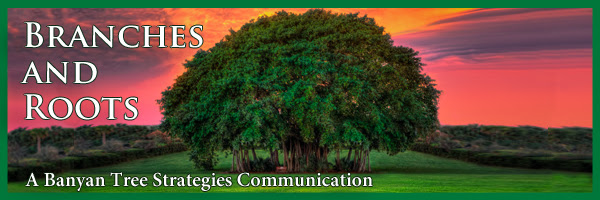|
"Branches & Roots": A Look at Strategy and Competition Through the Lens of Business and Sport A Banyan Tree Strategies Communication Mind Your Q's!Good morning and welcome to one of the swiftest and most productive 45 day periods of the year. We hope you were able to sneak away from the world this summer for a week or two, and were able to widen the aperture on your lens and appreciate the people and environment that exists in the margins of your life. Your ability to recreate outdoors with others during the long summer days really helps you re-create and re-set your values for the balance of the year. Late August now brings with it a fully engaged workforce for almost the first time since the middle of June. Projects and agenda’s that have been hampered by the summer vacation calendar will experience an immediate surge and we are curious if you might notice that as you refocus that you have picked up a bit of clarity. In this edition of Branches & Roots we will explore: • Why you should mind your Q’s as it relates to your performance. • The benefits of putting your team through a “Creative Abrasion” process. • How Coaches and Players can share values while having different roles and similar goals. • What swimming across Lake Tahoe has in common with the final round of the British Open. Why You Should Mind Your Q's Recent sociological research has started to notice that our ability to perform well in a role as an individual or as a member of a team can be traced back to 3 quotients. The first relates to your IQ and speaks to your ability to cognitively handle the tasks required. Knowing your strengths and then training to improve on them is vital. There are very few roles in today’s economy for people performing out of their strength, be sure you can articulate your capabilities and the contribution you can make. Your performance will be enhanced when you show the ability to understand how your contributions can blend with others for your joint benefit. Central to this concept is acquiring empathetic traits and building your emotional quotient, EQ. The force multiplier of working well with others sky rockets when the team sees the goal through everyone’s eyes and then seeks to achieve for their mutual benefit. Yet being smart and caring, doesn't appear to be enough these days. It turns out that your ability to be resilient and adaptable in the face of change, both as an individual and as a teammate are game changers. Click on the links for Ted talks from Amanda Lee Duckworth at Penn and Carol Dweck at Stanford, who are both actively researching how to add some grit to your life to help you improve your resiliency quotient, RQ. So the next time you hear the phrase “Mind your P’s and Q’s” we hope you will not only remember to say please and thank you, but you will also think about combining your wit, your heart, and your gut to be the most complete contributor possible. Speaking of Grit, can you pass me some sandpaper, I want to improve my team chemistry..... The first time your teacher, coach or boss decided you and your cohort would benefit from a little conditioning or organized conflict did you say to yourself, “yes, this is going to make me better and I can’t wait to have my lungs hurt, or be in a room where things might get tense”? Probably not, as most of us have a strong pain avoidance bias and it takes real training to get used to handling conflict while maintaining your full field of vision. Yet veteran teachers, coaches, and leaders all seem to have their own way of grooming a group of people into a team of people and these processes often include a term called “Creative Abrasion”. We learned of creative abrasion in Rich Karlgaard and Mike Malone’s new book Team Genius and further research points to a 1997 HBR article by Dorothy Leonard and Susan Straus. It turns out great teams can trust each other enough to bust on each other at the right time and in the right context. We are not saying that flamboyant conflict oriented people are the key to success, what we are noticing is that regardless of personality type, the best teams are relentless in the pursuit of improvement and that requires all parties bringing their creativity and best efforts to the group and trusting that the outcome will be better despite the apparent risks. The trick as the leader is when to introduce the concept, and how to implement and oversee the process. If you have a good story that proves or discredit’s our thesis, please share it here. If you are looking for more on how disagreement can help your team, we offer up Margaret Heffernan’s popular Ted Talk “Dare to Disagree”. How to get the roles right on your team, from the beginning In July we shared our “Coach Can I” video as part of our culture killer series which lead to a series of interesting discussions on the blurring of the roles between players and coaches. One such discussion occurred in early August when we ventured up to UOP for a check in with Glen Albaugh. We were working through the concept of creative abrasion and Glen pointed out that a wise coach or leader will take the time to help the players and coaches agree to their respective roles during the season before hitting the practice floor. When pressed to expand on this thought he further shared that the two groups need to articulate what they are responsible for and that each group gets to establish their own values, complete with both process and outcome goals for the season. Sharing these with each other establishes a relational bond that then allows them to start living out their values and driving towards their goals. What may seem as obvious to some was worth special mention to us, too often we see work teams where the roles of management and staff are blurred and chaos ensues. When setting up your next team at work consider laying out each groups roles and then allow both groups to define what they value and the acceptable attitudes and measurements they are willing to commit to as a team. If you want some expert help, email Glen. Why Mike Tyson can't swim across Lake Tahoe or win the British Open
“Everyone has a plan til they get punched in the mouth” - Mike Tyson Mike’s quote has two sides, one that challenges us to endure adversity and adapt, and a second more superficial message that appears to be telling us is that all you need to be able to do is land one good punch. In July was when we found the second point interesting while swimming in the Trans Tahoe Relays and watching Zach Johnson win the British Open at St. Andrews. The Trans-Tahoe swim has been a staple for many people going back decades and for the avid swimmer it is a wonderful experience. The relay requires each of the 6 swimmers to swim for 30 minutes which gets the team into the second half of the race, and then the duration of each swim drops to 15 minutes. Swimmers will often remark how much easier the second swim is after toiling for 30 minutes. It was during this year’s 30 minute leg that the Mike Tyson quote came to mind.Overcast skies and high winds accompanied the start of this year’s race and made for true rough water conditions, smiles on the boat abated, and each stroke was a challenge. After 5 minutes of swimming in what felt like a washing machine on the “Ice” cycle, I really wanted to just punch the lake in the mouth and be done with it. Sadly, there is no punching Lake Tahoe in the mouth, its size and strength demand your attention and respect at all times. The only recourse a swimmer can have at that moment is the resolve to keep swimming and work with the water, not against it. Which brings us to the British Open, which happens to always fall on the same weekend as the Trans Tahoe race. St. Andrew’s Old Course is considered by many to be too easy to host a modern Open and on a flat calm day that may be true, but find me 4 days in a row in its history where it has been calm. This year’s championship was another wonderful test of skill, flair, and resolve as player after player succumbed to the elements. Champion golfers with major championship titles to their credit were unable to keep their swings intact and their minds sharp for 4 days in a row. Several made it all the way to the final 7 holes before making the oddest mistakes and none of them could “punch St. Andrew’s in the mouth”. The champion Zach Johnson is known as a fighter, a grinder, and for the second time in his career he is a major championship winner. Something tells me, he figured out how to keep hitting quality shots and work with and not against the mighty winds of St. Andrew’s.
0 Comments
Your comment will be posted after it is approved.
Leave a Reply. |
Archives
November 2023
Categories
All
Complete Annual Newsletter Volumes
|

